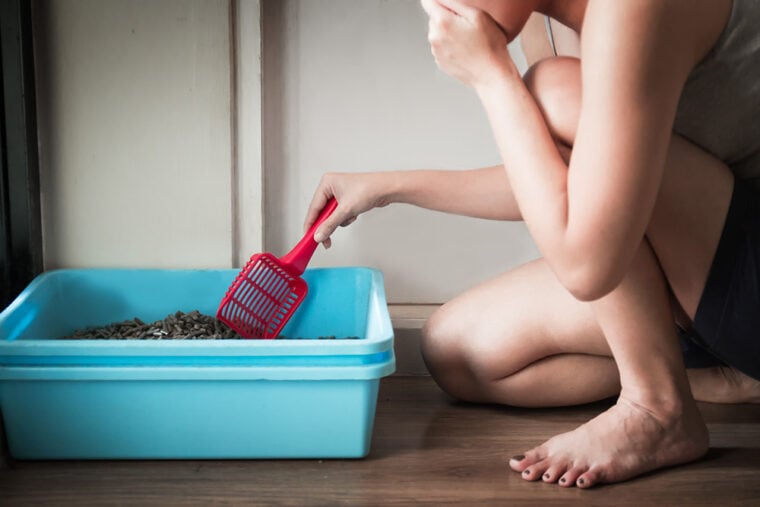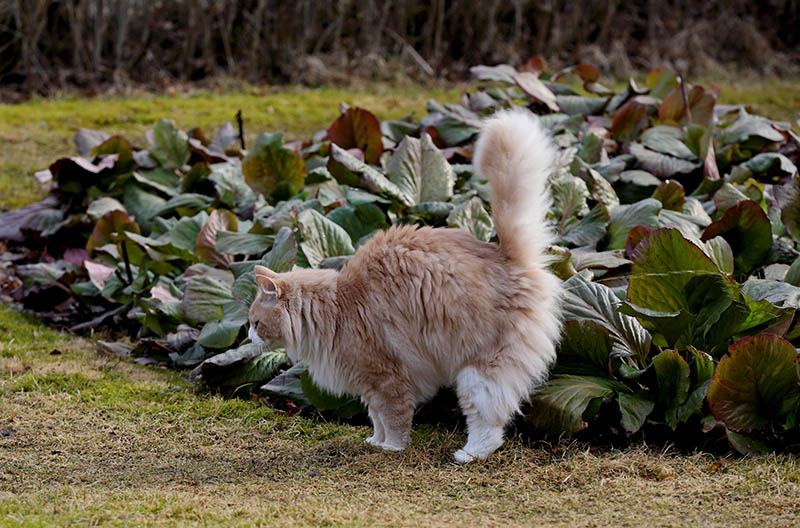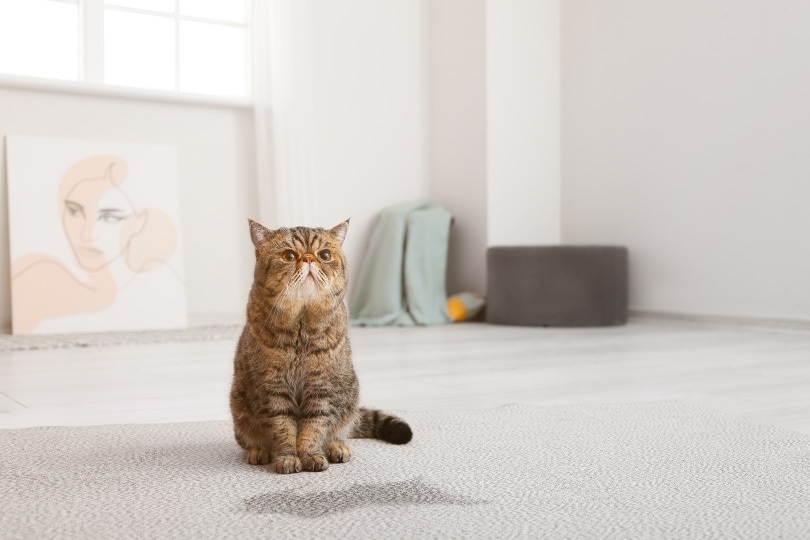
It’s universally acknowledged that cat urine carries a potent odor with it everywhere it goes. The stench lingers long after you have cleaned the litter box, and it can become even worse if your cat has had an accident or you haven’t cleaned the litter box in a while. All cat owners are familiar with the burning sensation in their noses as soon as they get a solid whiff of an overused litter box. But what are the causes of the horrible odor?
Why Does Cat Urine Smell?
The simplest answer to this is that cat pee is urine. It is waste produced by the body that is filtered by the kidneys and disposed of. In reality, cat urine doesn’t smell any worse than other urine. The key difference is that cat pee lingers and continues to assault the senses even after being disposed of. However, the disposal of the cat urine can take time as the urine is usually left untouched and unnoticed until it has already become a problem.

What About the Urine Smells?
Cat pee is a concentrated mixture of urea, creatine, uric acid, sodium, urobilin/urobilinogen, other electrolytes, pheromones, and bacteria. Urine is the byproduct, or result, of the body’s metabolism and natural processes. When our feline friends’ bodies break down the proteins and begin the first steps of decomposition and creation of the urine, urea is produced.
On its own, urea is odorless. However, once urea is excreted in the pee, bacterial metabolism converts it into ammonia. Ammonia is the evil culprit behind the most potent odors in cat urine.
Cat bodies have evolved to survive harsh conditions and thrive in various situations. One particular talent allows cats to conserve and use water more efficiently. A cat’s body absorbs moisture out of food, but it also absorbs the excess moisture out of urine to stay hydrated. This makes the cat’s urine darker and much more concentrated, and therefore, more potent.
 The 3 Reasons Why Your Cat’s Urine Smells Worse Than Normal
The 3 Reasons Why Your Cat’s Urine Smells Worse Than Normal
Even though cat urine has a strong odor, here are three things that can increase its potency.
1. Pheromones in Unneutered Male Cats
Cat pee has the power to reach superior stink levels when it comes to male cats and their pheromones. In general, male cats produce more potent urine than females. This becomes even more noticeable when the male cat is unneutered. Male cats have high levels of the pheromone Felinine in their urine. It is released in extra doses when a male cat marks their territory in the wild. The initial odor is still noticeable, but as it lingers in the wild it becomes more and more stinky the longer it goes uncleaned.
While in the wild, this means that the cat’s territorial markers don’t disappear immediately. The increased pheromones also explain why the odor left behind doesn’t just disappear with regular house cleaners and general upkeep. Getting your male cats fixed will not only reduce the smell, but it will also reduce the chances of them spraying inside your home.

2. Older Cats and Cats with Kidney Issues
A cat’s kidneys process and filter urine. If your cat is older or has diminished kidney functions, the urine can be more pungent than usual. Older cats are vulnerable to urinary issues, but cats of all ages can contract urinary infections.
3. Urine Left for an Extended Time
The last but not least possible cause of your cat’s urine being on the extra smelly side is time. If your cat has made a mess outside of the litter box or sprayed around your home, it must be cleaned immediately. We recommend scooping solids out of your cat’s litter box every day. If left unscoped, the urine in the box can build up and create as equally foul an odor as uncleaned urine on the carpet.

 How Do We Get Rid of the Smell?
How Do We Get Rid of the Smell?
If the source of the stench is your cat’s litter box, you need to scoop out solids and change the litter every day. You also should wash the litter box with mild soap and water. This will remove the scent from the box itself.
A general rule of thumb for cat owners is to make sure you have enough litter boxes for the number of cats in your home so the boxes don’t get overrun. You should have one box for every cat in your home, plus one. So, if you have one cat, you technically should have two litter boxes.
If you notice that the smell is coming from your carpet or an area in your home, you will need to clean it promptly. You can treat the soiled carpet with an enzymatic cleaner. Never use bleach to clean urine-stained items. Using bleach to clean urine can create toxic gases. Enzymatic products break down the chemicals in urea before they can turn into a nasty problem.
If you're looking to get rid of pet smells and stains in your house, we've got two awesome solutions for you that we need to share! Hepper's Pet Stain & Odor Eliminator Spray is a catch-all spray that removes smells and stains from any surface by using bioenzymes to not cover, but fully eliminate them. Then, we have their Litter Deodorizer Powder, which is basically a powdered version of the spray, so works wonders on surfaces you don't want to wet. Just sprinkle, and vacuum it up! It's not just for the litter box, but it does wonders there, too.
Check out the quick comparison of these amazing products below to see which product is best for your deodorizing needs – or, get both and take your cleaning to the next level!
 |
 |
|
|---|---|---|
| Hepper Advanced Bio-Enzyme Pet Stain & Odor Eliminator Spray | Hepper Advanced Bio-enzyme Deodorizer & Litter Additive | |
| Eliminates smells |
Eliminates smells:
|
Eliminates smells:
|
| Removes stains |
Removes stains:
|
Removes stains:
|
| Powdered/dry form |
Powdered/dry form:
|
Powdered/dry form:
|
| Liquid/wet form |
Liquid/wet form:
|
Liquid/wet form:
|
| Works on a variety of surfaces |
Works on a variety of surfaces:
|
Works on a variety of surfaces:
|
| Works inside your cat's litter |
Works inside your cat's litter:
|
Works inside your cat's litter:
|
At Pet Keen, we’ve admired Hepper for many years, and decided to take a controlling ownership interest so that we could benefit from the outstanding products of this cool cat company!
Conclusion
Your cat’s pee is unlikely to ever smell pleasant. However, if you notice a new, increased odor or change in odors coming from your cat’s litter box, please contact your veterinarian immediately.
Stinky urine is a small price to pay for all the love and affection we get from our furry feline friends. Even though you might have to wrinkle your nose and hold your breath, your cat is worth it!
Featured Image Credit: catinsyrup, Shutterstock







